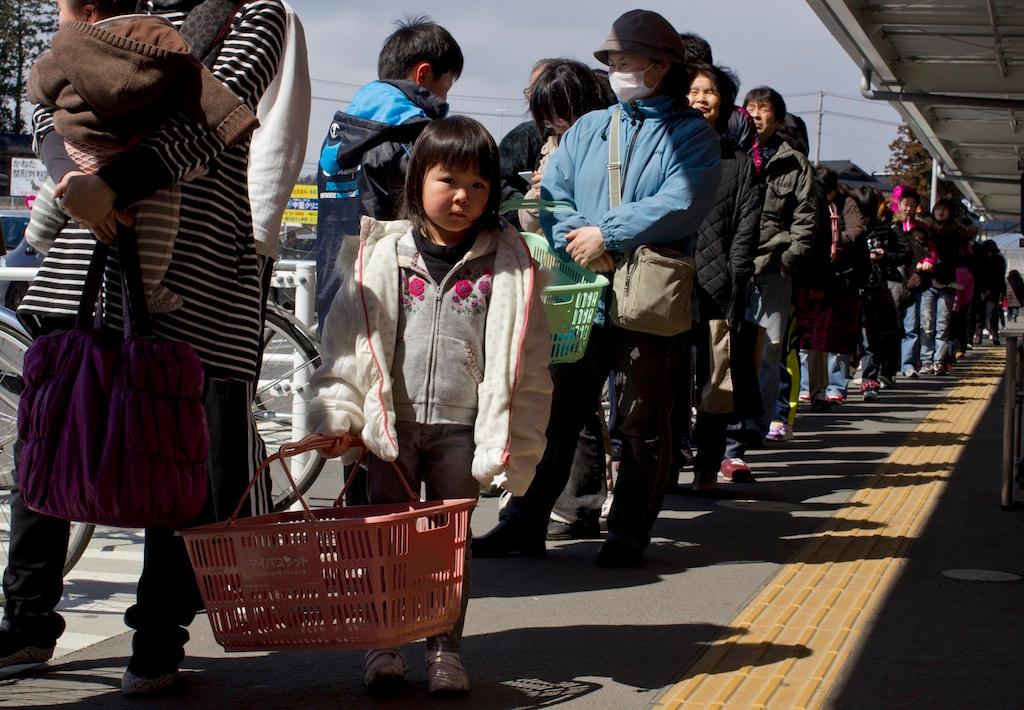Two Fukushima workers hospitalized due to radiation
Japanese wait in line for a supermarket to open to buy food items which are in low supply March 23, 2011, in Ichinoseki, Japan.
TOKYO, Japan — Two workers at Japan's tsunami-hit Fukushima nuclear power plant have been hospitalized after being exposed to high radiation as they battled to bring over-heating reactors under control, officials said.
The two men had been working to repair the cooling system to reactor 3, the BBC said. Japan nuclear agency spokesman Hideyuki Nishiyama said the pair had been exposed to radiation ranging from 170 to 180 milli-sieverts — in excess of the 100 milli-sieverts per year considered the limit for cancer risk.
As many Tokyo residents race to secure bottled water for their babies after a warning on radiation levels in tap water, a ban on some food imports from Japan's nuclear zone spread across Asia.
Australia, Hong Kong and Singapore became the latest countries to ban food imports from areas around Japan's stricken nuclear plant, which has been emitting radiation since it was damaged by an earthquake and tsunami on March 11.
The food ban includes dairy products, vegetables, fruits, meat and seafood, BBC reports.
It follows a ban by the United States, which on Tuesday was the first country to block produce from Japan.The Food and Drug Administration (FDA) halted the import of milk, vegetables and fruits. Imports will be halted from four prefectures in Japan's northeast, which was hit hardest by the disaster.
The FDA said the banned foods will be detained at the entry and not sold to the public, AP reported. Other foods from Japan, such as seafood, will continue to be sold but will be screened for radiation.
Japan expanded its list of restricted products Wednesday as well. Its Food Safety Commission barred shipments of certain vegetables from Fukushima prefecture and of milk and parsley from neighboring Ibaraki prefecture, the Wall Street Journal reports. It has also restricted some products from Gunma and Tochigi prefectures.
The food bans come after Japanese health officials last weekend found higher-than-permissible levels of radiation in some food.
Fears over radiation in tap water left many shops in Tokyo without bottled water, Reuters reports. Japanese officials told residents Wednesday not to give children under age 1 tap water because of contaminated water.
There were reports of radioactive iodine at twice the safe limit in water at a treatment plant that services the capital’s 23 wards and Greater Tokyo.
Tokyo's Governor Shintara Ishihara said there was no immediate health threat and urged people to "remain calm."
But the news, especially that babies under 1 year old shouldn't have tap water, sent mothers scurrying to the store.
“All the bottled water in the supermarket was gone immediately,” said Azusa Imamura, in her 50s, after a quick shopping trip in her crowded Tokyo suburb. “Nobody is sure of anything.”
Many mothers said they were confused about what was now safe to feed their children.
“If you breastfeed a baby, maybe the water in your system will also get into the milk,” said one young mother who preferred to remain nameless. Iodine-131, or radioactive iodine, is rapidly absorbed by the thyroid gland and, especially in children, increases the risk of thyroid cancer.
Amid rising anxiety, government spokesman Yukio Edano said authorities had put out the radiation warnings merely as a precaution. He assured the nation, in a televised speech, that Japan adhered to “strict safety standards.”
More than 25,000 people are now dead or missing from the disaster that destroyed entire towns and triggered a massive humanitarian crisis in addition to a nuclear accident.
About 300 engineers continue to work at the Fukushima Daiichi plant, which has seen progress in the past few days to reestablish its damaged cooling systems.
Engineers have managed to connect outside power lines to all six reactors, but extensive damage to the plant — much of which is still unknown — means workers have a way to go before they will be able to shut down all reactors.
And along the way, the plant continues to be at risk. Nuclear engineers said some of the most difficult and dangerous tasks involved in averting a nuclear crisis are still ahead, reports the New York Times.
“We’ve got at least 10 days to two weeks of potential drama before you can declare the accident over,” Michael Friedlander, a former nuclear plant operator, told the Times.
Every day, reporters and producers at The World are hard at work bringing you human-centered news from across the globe. But we can’t do it without you. We need your support to ensure we can continue this work for another year.
Make a gift today, and you’ll help us unlock a matching gift of $67,000!
